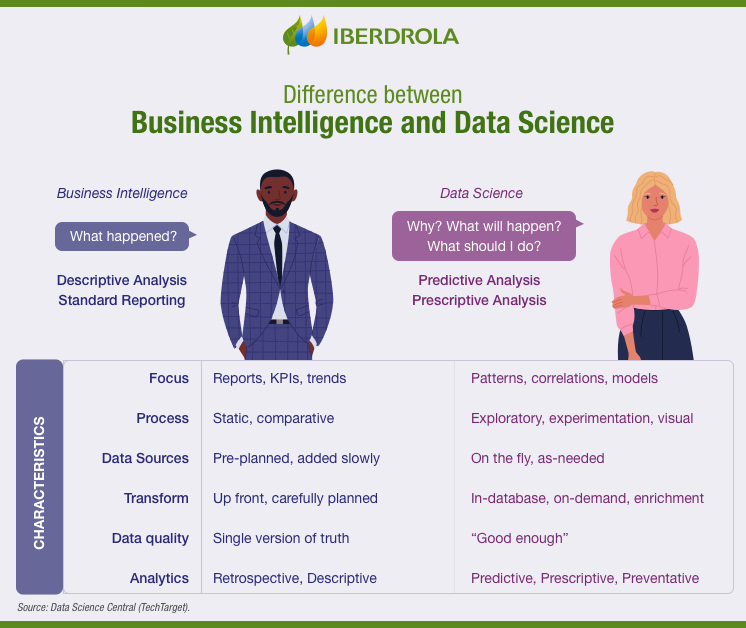What is business intelligence
Business intelligence, or how to interpret data to take better business decisions
In an era when we make more than 6 billion Google searches a day, the capacity to process, analyse and simplify massive amounts of data has become enormously important for companies. Business Intelligence harnesses the potential of this valuable resource, optimising business decisions and reporting while satisfying consumers.

"Knowledge is power". In a world where data is becoming more and more important, these words - attributed to the English philosopher Francis Bacon - ring truer than ever. To manage this flood of data, companies are looking to Business Intelligence to guide them to make the best possible decisions to make their businesses grow.
According to the Data Never Sleeps 8.0 External link, opens in new window. report prepared by the cloud-based operating system Domo, by the end of 2020, 347,000 Instagram stories a minute will be being posted, not to mention 147,000 photos on Facebook, and 500 hours of video on YouTube. What's more, 69,500 users will have applied for a job on LinkedIn, almost 42 million messages will be being sent on WhatsApp and consumers will be spending a million dollars on online purchases every minute. In total, says Global Datasphere
External link, opens in new window. report prepared by the cloud-based operating system Domo, by the end of 2020, 347,000 Instagram stories a minute will be being posted, not to mention 147,000 photos on Facebook, and 500 hours of video on YouTube. What's more, 69,500 users will have applied for a job on LinkedIn, almost 42 million messages will be being sent on WhatsApp and consumers will be spending a million dollars on online purchases every minute. In total, says Global Datasphere External link, opens in new window. from the International Data Corporation (IDC), we will have created, captured, copied and consumed more than 59 zettabytes — one ZB is equivalent to 1021 bytes — by the end of 2020. That means that today's knowledge requires enormous capacity to process, screen, analyse and simplify massive amounts of data.
External link, opens in new window. from the International Data Corporation (IDC), we will have created, captured, copied and consumed more than 59 zettabytes — one ZB is equivalent to 1021 bytes — by the end of 2020. That means that today's knowledge requires enormous capacity to process, screen, analyse and simplify massive amounts of data.
Definition of Business Intelligence. Differences with big data and data science
Top technology consultants and market research organisation Gartner says that Business Intelligence (BI) is "a generic term that encompasses applications, infrastructures and tools, as well as best practices for accessing and analysing information to improve and optimise corporate decision making and yield".
Because business intelligence is also fed by enormous amounts of data, it is sometimes confused with Big Data and Data Science. However, they are different concepts. To sum up, you might say that Big Data means capturing, storing and processing massive data, Data Science is the predictive and prescriptive analysis of those data, while Business Intelligence makes best use of the data to optimise corporate decision making and reporting.

 SEE INFOGRAPHIC: Differences between Business Intelligence and Data Science [PDF]
SEE INFOGRAPHIC: Differences between Business Intelligence and Data Science [PDF]
Benefits of Business Intelligence
The main advantage of Business Intelligence is that it enables companies to understand the forces shaping markets and businesses, helping them to get ahead of the competition in time to satisfy consumers' needs. Seeking specific results, the Business Application Research Center (BARC), which has been producing the BI Survey for more than 15 years, has drawn up a list with the main benefits attributed to business intelligence and the extent to which their tools have a positive impact on companies:
-
Create reports, analyse or plan faster and more precisely.
-
Improve business decision making and operational efficacy.
-
Boost customer and employee satisfaction.
-
Reduce costs and increase income.
-
Obtain better quality data and greater competitive advantages.
Business Inteligence Tools
The work of the business Intelligence department or post consists of providing data, analysing them within their context, evaluating risks and taking business decisions. They do this with BI tools that tend to be classed in three categories:
Data management tools
These are used to purge, standardise, extract, transform and transfer data from different sources to a specific system.
Data discovery tools
These are used to compile and combine data from multiple sources through data mining to identify patterns and trends and make predictions.
Reporting tools
After processing the information, these tools help to present it simply and visually. They also make it possible to enter the information in dashboards to evaluate their degree of compliance with the company's key performance indicators (KPIs).
These days, the tools are offered to companies in a wide range of software programmes. Some of the most popular of these are:
-
Microsoft Power BI. This tool makes it possible to connect to hundreds of local or cloud-based data sources and to model key information easily to make it digestible, creating dashboards that offer a 360º overview of the business in real time, and reports with useful information to improve the results.
-
IBM Cognos Analytics. This suite integrates reports, models, analysis, dashboards and records that companies can use to better understand their data and take more efficient decisions. It is known for being intuitive and easy to use and for working in conjunction with IBM Watson artificial intelligence.
-
Oracle Business Intelligence. This is a portfolio of applications that includes, among others, a BI base and tools — queries, reports, analysis, alerts, integration, data management, etc. — whose main characteristics are usability, advanced visualisation, ease of integration, personalisation and real-time alert creation.




